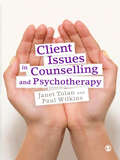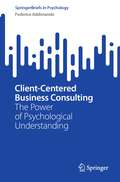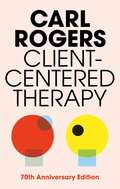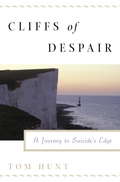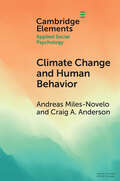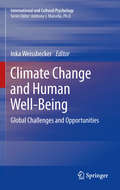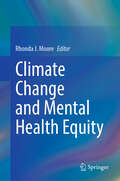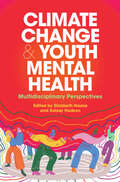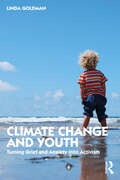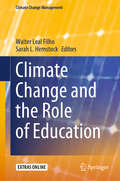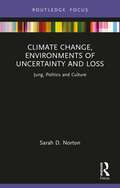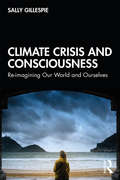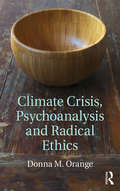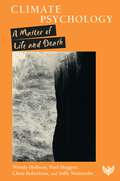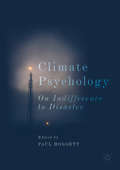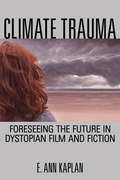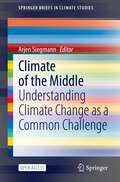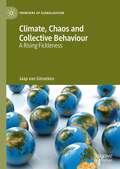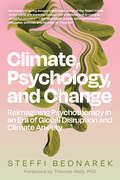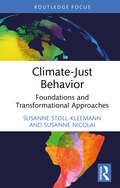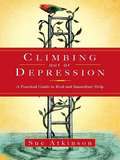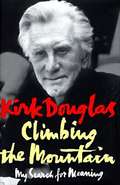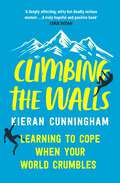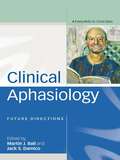- Table View
- List View
Client Issues in Counselling and Psychotherapy: Person-centred Practice
by Janet Tolan Paul WilkinsThis is the first book to focus on commonly occurring client issues and explore how to work with them from a person-centred perspective. Extensive case studies translate person-centred theory into effective practice, enabling therapists to work successfully with clients presenting a variety of different problems including: - Post Traumatic Stress - Depression - Panic and Anxiety - Drug and Alcohol Issues - Eating difficulties - Self harm - Childhood Sexual Abuse Each chapter covers the origin and meaning of the difficulty, the person-centred therapeutic approach and process, and the outcomes. Drawing from a combined 50 years of experience in the field, Paul Wilkins and Janet Tolan bring together leading person-centred therapists to address how and why each problem can be eased by means of working with the person. This book should be on the desk of every counselling and psychotherapy trainee, and is recommended reading for other practitioners of health and social care working with these client groups.
Client-Centered Business Consulting: The Power of Psychological Understanding (SpringerBriefs in Psychology)
by Federico AddimandoThis book explores the psychology behind effective business consulting. We dive into the various factors that shape client behavior and decision-making, and we provide insights into the most effective techniques and strategies for building rapport, establishing trust, and delivering value. Whether you are a seasoned consultant looking to refine your skills, or a new consultant seeking to build a solid foundation, this book is designed to provide you with the tools and knowledge you need to succeed in the dynamic and demanding world of business consulting.
Client-Centered Therapy: Its Current Practice, Implications, and Theory
by Carl RogersPresenting the non-directive and related points of view in counselling and therapy, this book defines the progress recently made in the development of the techniques and basic philosophy of counselling.
Cliffs of Despair
by Tom HuntBeachy Head is a bit of quintessential England–a seaside promontory where green pastures roll to the edge of chalk cliffs, a place of sheep and wind and ineffable beauty. But it is also a major landmark on the map of self-inflicted death. Since 1965, some five hundred people have ended their lives by jumping or driving or simply walking off the 535-foot cliffs, making Beachy Head one of the most popular suicide spots in the world. And still they come, every week another one or two–the young and the old, the terminally ill and the vigorously healthy, the bereft, the insane, the despairing. Why here? Why so many? One chilly English spring, American writer and teacher Tom Hunt left his home and family and journeyed to this bucolic landscape to find out. In a narrative that seamlessly weaves together personal memoir, history, travelogue, and investigative journalism, Hunt recounts a season of disturbing revelations (including that Princess Diana allegedly came here intending to jump). Still reeling from a suicide in his own family, Hunt arrives in England obsessed with Beachy Head’s grisly mystique, yet utterly unsure of what he would discover. Gradually, with typical English reserve, the people who haunt this extraordinary place release their secrets. Servers in the local tavern–known among residents as the Last Stop Pub–whisper about their encounters with hollow-eyed men and women in their final hours. The celebrated local witch asserts his belief that the place was once used for human sacrifice. The kindly coroner provides access to suicide notes, photographs, and the Sudden Death file. “It’s a very cold solution,” confides a wheelchair-bound ex-hippie who miraculously survived his own jump. In the course of wrenching interviews with bereft family members, watchful taxi drivers, and brave rescue workers, it dawns on Hunt that in each of us is a will to die every bit as tenacious and unyielding as the desire to live–and that Beachy Head stiffens and heightens this death wish. It’s a stage that all but begs to be leapt from. A work of terrible sadness and harrowing revelations, Cliffs of Despair is the account of an unforgettable journey to a place where beauty and death collide. From the Hardcover edition.
Climate Change and Human Behavior: Impacts of a Rapidly Changing Climate on Human Aggression and Violence (Elements in Applied Social Psychology)
by Andreas Miles-Novelo Craig A. AndersonMuch of the current rhetoric surrounding climate change focuses on the physical changes to the environment and the resulting material damage to infrastructure and resources. Although there has been some dialogue about secondary effects (namely mass migration), little effort has been given to understanding how rapid climate change is affecting people on group and individual levels. In this Element, we examine the psychological impacts of climate change, especially focused on how it will lead to increases in aggressive behaviors and violent conflict, and how it will influence other aspects of human behavior. We also look at previously established psychological effects and use them to help explain changes in human behavior resulting from rapid climate change, as well as to propose actions that can be taken to reduce climate change itself and mitigate harmful effects on humans.
Climate Change and Human Well-Being: Global Challenges and Opportunities (International and Cultural Psychology)
by Inka WeissbeckerClimate change is increasing the severity of disasters and adverse weather conditions worldwide, with particularly devastating effects on developing countries and on individuals with lower resources. Climate change is likely to impact mental health and psychosocial well-being via multiple pathways, leading to new challenges. Direct effects such as gradual environmental changes, higher temperatures, and natural disasters, are likely to lead to more indirect consequences such as social and economic stressors, population displacement, and conflict. Climate change, largely the product of industrialized nations, is projected to magnify existing inequalities and to impact the most vulnerable, including those with low resources, individuals living in developing countries and specific populations such as women, children and those with pre-existing disabilities. This book outlines areas of impact on human well being, consider specific populations, and shed light on mitigating the impact of climate change. Recommendations discuss ways of strengthening community resilience, building on local capacities, responding to humanitarian crises, as well as conducting research and evaluation projects in diverse settings.
Climate Change and Mental Health Equity
by Rhonda J. MooreClimate change is a driver of poverty, poor mental health, inequity, and increased intersectional vulnerability, with significant differential global impacts on individual and community health and well-being. For example, people living in low resource settings in high income countries (HICs) and in low and middle-income countries (LMICs) are at greater risk, often experiencing fragile socioeconomic, political and health infrastructures, and conflict-affected settings (FCAS) that place them at greater risk and vulnerabilities to climate change related mental health impacts. The broad goal of this book is to place a social justice and inclusive lens on climate change and mental health equity focusing on these three key elements: people, place, and community. The book includes perspectives from the global North, the global South, and Indigenous perspectives to help provide greater insight into how we can better understand climate change and mental health equity across peoples, place, and community. This book’s three-pronged approach will focus on certain trends in this emerging and growing field, also bridging some of the more extensive gaps, and is a tool for better understanding how mental health disparities might be addressed at this time.
Climate Change and Youth Mental Health: Multidisciplinary Perspectives
by Elizabeth Haase Kelsey HudsonClimate change is the biggest threat of our century, one that will impact every aspect of children's lives: their physical, emotional, moral, financial, and social health and well-being. The relationship between the climate crisis and mental health in young people is therefore by definition multi-disciplinary and multi-cultural, requiring multiple perspectives on how to understand and guide younger generations. This book provides a unique synthesis of those perspectives - the science, psychology, and social forces that can be brought to bear on supporting young people's psychological well-being. No matter the setting in which an adult may interact with younger people, this book provides the intellectual rigor and tools to ensure those interactions are as helpful and supportive as they can be.
Climate Change and Youth: Turning Grief and Anxiety into Activism
by Linda GoldmanClimate Change and Youth is a pioneering book that opens the door to understanding the profound impact climate change has on the mental health of today’s young people. Chapters provide age-appropriate language for a meaningful dialogue and resources for acknowledging children’s voices, separating fact from fiction about environmental issues, encouraging participation in activism, creating tools to reduce stress, and highlighting inspirational role models and organizations for action. The book includes firsthand examples, research, children’s work, interviews, and terminology. It also shares age-appropriate resources and websites relating to climate change and challenges. Filling a large void in the literature on this topic, this essential resource offers techniques and tools that professionals and caring adults can use to address the stresses associated with climate change and offer strategies for hope, resilience, and action.
Climate Change and the Role of Education (Climate Change Management)
by Walter Leal Filho Sarah L. HemstockThis book offers insights into the educational dimensions of climate change and promotes measures to improve education in this context. It is widely believed that education can play a key role in finding global solutions to many problems related to climate change. Indeed, education as a process not only helps young people to better understand and address the impact of global warming, but also fosters better attitudes and behaviours to aid efforts towards mitigating climate change and adapting to a changing environment. But despite the central importance of education in relation to climate change, there is a paucity of publications on this theme. Against this background, the book focuses on the educational aspects of climate change and showcases examples of research, projects and other initiatives aimed at educating various audiences. It also provides a platform for reflections on the role education can play in fostering awareness on a changing climate. Presenting a wide range of valuable lessons learned, which can be adapted and replicated elsewhere, the book appeals to educators and practitioners alike.
Climate Change, Environments of Uncertainty and Loss: Jung, Politics and Culture (Focus on Jung, Politics and Culture)
by Sarah D. NortonFocusing on one of the most significant and critical issues facing the world today, this important book explores multiple aspects of climate change through the use of Jungian symbols and "signs" of this environmental shift, while diving deep into the politics of loss in reaction to climate chaos, uncertainty, and ambiguity.Despite the imminent threat of ecological crisis, many treat this existential crisis as something that can be pushed to the side, ignored, and denied. The loss of natural habitats, species, land, human life, and health continues, acknowledged or not. Unconsciously, a necessary process of grief is bubbling up from the depths as a reaction to this climate crisis. This grief, often disguised as anger or inaction, can lead to individual and political action if it is engaged consciously and directed with purpose. From forest fires, to melting ice, to bleached coral, and warming oceans, within the chapters of this book, each sign of our changing planet is explored in depth from multiple perspectives. Through this exploration, each is revealed as a Jungian symbol encompassing so much more than we consciously comprehend. Each symbol is brought to life in the context of this political, communal, and individual space of loss, transforming a subversive grieving process into creative, conscious action.This is essential and accessible reading for those within the fields of depth psychology, environmental sciences, humanities, and politics, as well as anyone wishing to gain more insight into the current climate crisis and their place within it.
Climate Crisis and Consciousness: Re-imagining Our World and Ourselves
by Sally GillespieClimate crisis disrupts the beliefs, values and behaviors of contemporary societies, sparking potential for radical changes in culture and consciousness. Drawing upon her experience as a Jungian psychotherapist and a researcher in the field of climate psychology, Sally Gillespie writes about the challenges, dilemmas, opportunities and transformations of engaging with climate and ecological crises. Many factors shape how we understand and respond to the existential threats of climate crisis. This accessible book with its discussions about worldviews, cultural myths, emotional resilience, social connectedness, nature relatedness and collective action explores consciousness change in those most engaged with climate issues. Calling upon the words and stories of many people, including Indigenous leaders, ecologists, campaigners, writers and philosophers, Gillespie encourages us to enter into climate conversations to forge emotional resilience, ecological consciousness and inspired action. With its unique focus on the psychological experience of facing into the climate crisis, this warm and supportive book offers companionship and sustenance for anyone who wants to be alive to our natural world and to the existential challenges of today. It is an essential resource for counsellors, psychotherapists, social workers and other helping professionals, as well as climate campaigners, policy makers, educators, scientists and researchers.
Climate Crisis, Psychoanalysis, and Radical Ethics
by Donna M. OrangePsychoanalysis engages with the difficult subjects in life, but it has been slow to address climate change. Climate Crisis, Psychoanalysis, and Radical Ethics draws on the latest scientific evidence to set out the likely effects of climate change on politics, economics and society more generally, including impacts on psychoanalysts. Despite a tendency to avoid the warnings, times of crisis summon clinicians to emerge from comfortable consulting rooms. Daily engaged with human suffering, they now face the inextricably bound together crises of global warming and massive social injustices. After considering historical and emotional causes of climate unconsciousness and of compulsive consumerism, this book argues that only a radical ethics of responsibility to be "my other’s keeper" will truly wake us up to climate change and bring psychoanalysts to actively take on responsibilities, such as demanding change from governments, living more simply, flying less, and caring for the earth and its inhabitants everywhere. Linking climate justice to radical ethics by way of psychoanalysis, Donna Orange explores many relevant aspects of psychoanalytic expertise, referring to work on trauma, mourning, and the transformation of trouble into purpose. Orange makes practical suggestions for action in the psychoanalytic and psychotherapeutic communities: reducing air travel, consolidating organizations and conferences, better use of internet communication and education. This book includes both philosophical considerations of egoism (close to psychoanalytic narcissism) as problematic, together with work on shame and envy as motivating compulsive and conspicuous consumption. The interweaving of climate emergency and massive social injustice presents psychoanalysts and organized psychoanalysis with a radical ethical demand and an extraordinary opportunity for leadership. Climate Crisis, Psychoanalysis, and Radical Ethics will provide accessible and thought-provoking reading for psychoanalysts and psychotherapists, as well as philosophers, environmental studies scholars and students studying across these fields.
Climate Crisis, Psychoanalysis, and Radical Ethics
by Donna M. OrangePsychoanalysis engages with the difficult subjects in life, but it has been slow to address climate change. Climate Crisis, Psychoanalysis, and Radical Ethics draws on the latest scientific evidence to set out the likely effects of climate change on politics, economics and society more generally, including impacts on psychoanalysts.Despite a tendency to avoid the warnings, times of crisis summon clinicians to emerge from comfortable consulting rooms. Daily engaged with human suffering, they now face the inextricably bound together crises of global warming and massive social injustices. After considering historical and emotional causes of climate unconsciousness and of compulsive consumerism, this book argues that only a radical ethics of responsibility to be "my other’s keeper" will truly wake us up to climate change and bring psychoanalysts to actively take on responsibilities, such as demanding change from governments, living more simply, flying less, and caring for the earth and its inhabitants everywhere.Linking climate justice to radical ethics by way of psychoanalysis, Donna Orange explores many relevant aspects of psychoanalytic expertise, referring to work on trauma, mourning, and the transformation of trouble into purpose. Orange makes practical suggestions for action in the psychoanalytic and psychotherapeutic communities: reducing air travel, consolidating organizations and conferences, better use of internet communication and education. This book includes both philosophical considerations of egoism (close to psychoanalytic narcissism) as problematic, together with work on shame and envy as motivating compulsive and conspicuous consumption.The interweaving of climate emergency and massive social injustice presents psychoanalysts and organized psychoanalysis with a radical ethical demand and an extraordinary opportunity for leadership. Climate Crisis, Psychoanalysis, and Radical Ethics will provide accessible and thought-provoking reading for psychoanalysts and psychotherapists, as well as philosophers, environmental studies scholars and students studying across these fields.
Climate Psychology: A Matter of Life and Death
by Wendy Hollway Paul Hoggett Chris Robertson Sally WeintrobeClimate Psychology offers ways to work with the unthinkable and emotionally unendurable current predicament of humanity. The style and writing interweave passion and reflection, animation and containment, radical hope and tragedy to reflect the dilemmas of our collective crisis. The authors model a relational approach in their styles of writing and in the book's structure. Four chapters, each with a strikingly original voice and insight, form the core of the book, held either end by two jointly written chapters. In contrast to a psychology that focuses on individual behaviour change, the authors use a transdisciplinary mix of approaches (depth psychology and psychotherapy, earth systems, deep ecology, cultural sociology, critical history, group and institutional outreach) to bring into focus the predicament of this period. While the last decade required a focus on climate denial in all its manifestations (which continues in new ways), a turning point has now been reached. Increasingly extreme weather across the world is making it impossible for simple avoidance of the climate threat. Wendy Hollway, Paul Hoggett, Chris Robertson, and Sally Weintrobe address how climate psychology illuminates and engages the life and death challenges that face terrestrial life. This book will appeal to three core groups. First, mental health and social care professionals wanting support in containing and potentially transforming the malaise. Second, activists wanting to participate in new stories and practices that nurture their engagement with the present social and cultural crisis. Third, those concerned about the climate emergency, wanting to understand the deeper context for this dangerous blindness.
Climate Psychology: On Indifference to Disaster (Studies in the Psychosocial)
by Paul HoggettThis book investigates the psycho-social phenomenon which is society’s failure to respond to climate change. It analyses the non-rational dimensions of our collective paralysis in the face of worsening climate change and environmental destruction, exploring the emotional, ethical, social, organizational and cultural dynamics to blame for this global lack of action. The book features eleven research projects from four different countries and is divided in two parts, the first highlighting novel methodologies, the second presenting new findings. Contributors to the first part show how a ‘deep listening’ approach to research can reveal the anxieties, tensions, contradictions, frames and narratives that contribute to people’s experiences, and the many ways climate change and other environmental risks are imagined through metaphor, imagery and dreams. Using detailed interview extracts drawn from politicians, scientists and activists as well as ordinary people, the second part of the book examines the many different ways in which we both avoid and square up to this gathering disaster, and the many faces of alarm, outrage, denial and indifference this involves.
Climate Trauma
by E. Ann KaplanEach month brings new scientific findings that demonstrate the ways in which human activities, from resource extraction to carbon emissions, are doing unprecedented, perhaps irreparable damage to our world. As we hear these climate change reports and their predictions for the future of Earth, many of us feel a sickening sense of déjà vu, as though we have already seen the sad outcome to this story. Drawing from recent scholarship that analyzes climate change as a form of "slow violence" that humans are inflicting on the environment, Climate Trauma theorizes that such violence is accompanied by its own psychological condition, what its author terms "Pretraumatic Stress Disorder." Examining a variety of films that imagine a dystopian future, renowned media scholar E. Ann Kaplan considers how the increasing ubiquity of these works has exacerbated our sense of impending dread. But she also explores ways these films might help us productively engage with our anxieties, giving us a seemingly prophetic glimpse of the terrifying future selves we might still work to avoid becoming. Examining dystopian classics like Soylent Green alongside more recent examples like The Book of Eli, Climate Trauma also stretches the limits of the genre to include features such as Blindness, The Happening, Take Shelter, and a number of documentaries on climate change. These eclectic texts allow Kaplan to outline the typical blind-spots of the genre, which rarely depicts climate catastrophe from the vantage point of women or minorities. Lucidly synthesizing cutting-edge research in media studies, psychoanalytic theory, and environmental science, Climate Trauma provides us with the tools we need to extract something useful from our nightmares of a catastrophic future.
Climate of the Middle: Understanding Climate Change as a Common Challenge (SpringerBriefs in Climate Studies)
by Arjen SiegmannThis Open Access book presents a multidisciplinary perspective to increase our understanding of climate policies that are rooted in the natural moral inclinations of people, families and firms. Which policies prevent a widening gap between higher and lower educated people? Which policy instruments are there, and how could they be used? What is the role of free entrepreneurship?In this book, academics from different fields have brought together their knowledge and expertise to reflect on the following three questions: How are the polarised positions on climate change of different groups related to their moral outlook, world view, tradition, cultural norms and values? What is a good distribution of responsibilities between firms, households and the government relating to climate change? What are possible avenues where the climate policies are a natural extension of moral inclinations of families and firms, such as the stewardship for the natural environment and the climate? This book will be of interest to policy and decision-makers, students of social and behavioural sciences, and those interested climate change policies and how this effects our lives
Climate, Chaos and Collective Behaviour: A Rising Fickleness (Frontiers of Globalization)
by Jaap van GinnekenThis book introduces principles of Chaos theory (and Complex Adaptive Systems) to social science, in a lively and elegant way. It applies it to the twin disciplines of mass psychology (under social psychology, mostly in Europe) and collective behavior sociology (mostly in North America) that deal with emergent psychosocial phenomena that lie outside conventional approaches. Each of the eleven chapters begins with a topical ‘case study’ section, on an issue related to climate change and collective behaviour, such as the ‘school strike’ by Swedish schoolgirl Greta Thunberg, the Hollywood movie The Day After Tomorrow, and more. This book aims to show that there are fundamental reasons why many phenomena cannot be easily ‘measured, predicted and controlled’, and thus we need to familiarize ourselves with alternative ways of thinking about them.
Climate, Psychology, and Change: Reimagining Psychotherapy in an Era of Global Disruption and Climate Anxiety
by Steffi BednarekWith so many immediate and intensifying crises unfolding around us, how can therapists adapt to promote healing and growth?&“As these intriguing essays make clear, some of the finest minds in the world are thinking through the problems and arriving at powerful answers."—Bill McKibben, author, environmentalist, educator, activist, and founder of Third ActWith essays from Francis Weller, Bayo Akomolafe, Hāweatea Holly Bryson, and moreWestern psychotherapy views our practice as a way to bring clients back to baseline &“normal.&” But our society&’s &“normal&” is profoundly unwell: our ways of being reflect the same unsustainable systems that erode our ecosystems, accelerate global destruction, and ultimately extract our humanity. Moving toward healing and purpose in uncertain times means evolving the way we do therapy and the way we think about mental health.Editor and climate psychologist Steffi Bednarek invites us to co-create a field that navigates unknown futures with skill and grace—one that helps clients build resilience and holds space for the uncertainties unfolding before us. She and 32 contributors explore ideas like:Decolonizing therapyUsing therapeutic tools to respond to traumaWhat psychologists can offer movements for social change and climate justiceHelping clients recognize and move past unhelpful responses to climate emergencyNurturing creativity in the face of crisisHolistic and intersectional, this collection reckons with the ways power, colonialism, and capitalism impact our myriad crises—while shaping Western psychology as we know it.With essays by clinicians from both the Global South and Global North, Climate, Psychology, and Change is an anthology unlike anything you&’ve read before: a necessary response, an urgent appeal, and a fearless look forward at how we care for our clients, eyes wide open, with compassion and skill in an uncertain world.
Climate-Just Behavior: Foundations and Transformational Approaches (Routledge Focus on Environment and Sustainability)
by Susanne Stoll-Kleemann Susanne NicolaiThis book highlights the obstacles to and potential for a just transformation as a way out of the current climate crisis.This volume examines the barriers, opportunities and incentives around the pursuit of climate-just behavior, based on a comprehensive interdisciplinary and integrative analysis. It investigates how the gap between expressing concern about the climate crisis and giving it a high priority within the context of everyday behavior can be overcome. At the same time, it looks at the challenging politico-economic framework conditions such as the strong economic growth and profit orientation of capitalism. Although justice is a fundamental human motive, which should induce climate-just behavior, system justification is common and makes people rather justify their unjust behavior. In this book, a general and systemic framework on human behavior is provided, including internal factors, such as knowledge and psychological needs, external factors, such as socio-cultural and politico-economic factors, feedback loops and interactions. The authors draw on multiple theories to examine how denial and moral disengagement affect individual responsibility, despite real-world evidence of the climate crisis. The book highlights the role of emotions in encouraging a pro-environmental response and discusses solutions on both the individual and the collective level, such as transparency laws. Moreover, making climate-friendly options more accessible, affordable and convenient facilitates behavior change more effectively. Overall, this book presents knowledge-based, realistic approaches to surmounting these obstacles in order to achieve a more climate-just world.Climate-Just Behavior will be of great interest to students and scholars of climate change, climate justice, environmental geography and environmental psychology.
Climbing Out of Depression
by Sue AtkinsonBeing depressed often leaves you feeling paralysed into inaction. Climbing back out of the pit of gloom seems almost impossible. You need help, and that is what this book offers - practical, humane and spiritual help. Sue Atkinson has suffered years of depression herself. She does not write as an expert on depression or as a depression counsellor, but as someone who knows the feelings from close personal experience. As a result, her book contains a varied menu of hints, quotations and illustrations, not page after page of unbroken text. This is a book to dip into as fits your mood and need, making a dependable guide to the climb.
Climbing the Mountain: My Search for Meaning
by Kirk DouglasThe famous actor's quest not only for the meaning of life and his own relationship to God, but for his own identity as a Jew.
Climbing the Walls
by Kieran CunninghamWhen mountains are your salvation, what keep your mental weather calm and free of storms, how do you cope if they&’re out of reach? After spending a decade restlessly globetrotting in search of a way of life that worked for him, journalist Kieran Cunningham alighted on Sondrio, a small town in Lombardy, Italy. A stone&’s throw from the Alps, there he found the perfect combination of fresh mountain air, a strong network of local friends and lots of climbing. Finally he was able to accept and manage his diagnosis of Bipolar 1. And then Lombardy found itself the European epicentre of Covid-19 and subject to the strictest of lockdowns. What does a climber do when his beloved peaks are off limits? When he&’s only permitted to leave the house for his weekly sanctioned grocery shop? When all the things that help him maintain his delicate equilibrium are taken away? As Kieran feels his mental health begin to crumble, he looks desperately for something he can climb to help rid him of his excess energy and hopefully get him back on track. Kieran finds himself navigating the walls of his house over and over while gazing at the mountain ranges so tantalisingly close. He dreams of that first euphoric climb – alone in the clouds, tired, happy, sated. Climbing the Walls is a memoir about mental health and the power of nature and exercise. It&’s both a devastatingly honest account of living with Bipolar 1 and a love song to small-town Italian life and the high places that keep him healthy.
Clinical Aphasiology: Future Directions: A Festschrift for Chris Code
by Martin J. Ball Jack S. DamicoThis book presents a collection of cutting edge work from leading researchers and clinicians around the world on a range of topics within Clinical Aphasiology. However, more than this, the volume is also a tribute to Chris Code, one of the foremost scholars in the field. Professor Code has made a galvanizing impact on the field: as a savant, a motivator and an impresario of trends which have resulted in several significant developments in the field. In the first chapter of this book the editors outline the considerable contributions Chris Code has made to the area. The remaining contents have been divided into three main approaches to the study of aphasia, reflecting Professor Code’s own interests. First are the contributions that fall under the heading of Conceptual Considerations. These are mainly interdisciplinary in nature, spanning linguistics, phonetics, psychology and neurology, as well as social aspects of communication disorders. The second section of the book deals with Research Considerations, with chapters ranging from how the study of disrupted communication can inform models of normal language processing, through tone production and processing in speakers with aphasia, to anomia and progressive multifocal leukoencephalopathy. Each of these chapters explores different aspects of research methodology, including quantitative and qualitative research. The final section of the collection deals with Clinical Considerations; the chapters here cover counselling, computerized training, cultural and linguistic diversity in aphasia, right hemisphere disorders, and communication problems in the dementias. Clinical Aphasiology will be an invaluable tool for both students and practitioners in speech and language pathology, psychology, neurology, and related fields.
